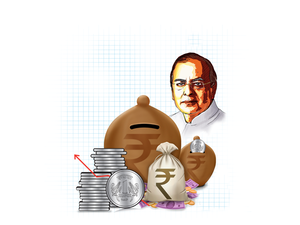
Buried deep inside the Finance Bill, 2018 is an important amendment that could have an impact on the way the Public Provident Fund (PPF) functions. In the Finance Bill, provisions have been made to repeal The Public Provident Fund Act, 1968.
However, this will only happen if this provision of the Bill is passed by the Parliament. Once passed it will stand repealed from the date when it is published in the official gazette.
But don't worry, this does not mean that the PPF will be discontinued. What this means is that all small savings schemes including PPF will now be covered under the Government Savings Banks Act, 1873.
All these schemes will now fall under the ambit of the Government Savings Banks Act: Post Office Savings Account, National Savings Monthly Income (Account), National Savings Recurring Deposit, Sukanya Samridhhi Account, National Savings Time Deposit (1 year, 2 years, 3 years and 5 years, Senior Citizens' Savings Scheme, Savings Certificates, Kisan Vikas Patra , National Savings Certificates (VIII Issue) and Public Provident Fund Scheme.
Also Read: How to open a PPF account? Know its rules and benefits
The Finance Bill 2018 makes it clear that the ongoing structure of the schemes will not change if the PPF Act is repealed. Here is what the Bill says:
- "All deposits made or accounts or certificates held under the repealed enactments shall be deemed to be deposits or holdings in the Savings Scheme made under the corresponding provisions of this (Government Savings Banks Act, 1873) Act."
- "The repeal shall not prejudicially affect the interest of depositors who, before the commencement of the Finance Act, 2018, made deposits or were issued certificates or made contribution to any scheme under the repealed enactments."
- "Anything done or any action taken or purported to have been done or taken, including any rule, notification, order or notice made or issued or any direction given under the repealed enactments shall be deemed to have been done or taken under the corresponding provisions of this (Government Savings Banks Act, 1873 ) Act."
- Although structurally nothing will change with the PPF, one of the major advantages of the scheme may be jeopardised. PPF currently enjoys the freedom from court attachment (but not attachment under any order of income tax and estate duty authorities), i.e., the balance to the credit of a subscriber in his account is not subject to attachment under any order or decree of a court in respect of any debt or other liability incurred by him. This provision may not exist as the PPF Act itself is being repealed. "The deposits of investors in the PPF account before the commencement of the proposed amendment shall enjoy the current protection against attachment as is available. However, with respect to any deposits made by the investors in the PPF schemes after the proposed amendment is legislated, there seems to be currently no provision proposed for protection against attachment. There is no provision under the Government Savings Banks act 1873 with respect to protection from attachment against any decree as was available under the PPF Act," said Suresh Surana, Founder, RSM Astute Consulting Group.He added that it would be appear that the deduction under section 80C shall continue for the deposits under the Government Savings Banks Act 1873 (which continue to be termed as Public Provident Fund) subject to notification by the Government. "Similarly , the interest income on such deposits also should continue to enjoy the exemption (refer section 10(15) of the Act ). However, an explicit notification/ clarification by the government in this respect would be necessary."To reiterate, as far as the features and the safety of the principal and interest earned on the PPF is concerned, it will remain the same.
No comments:
Post a Comment